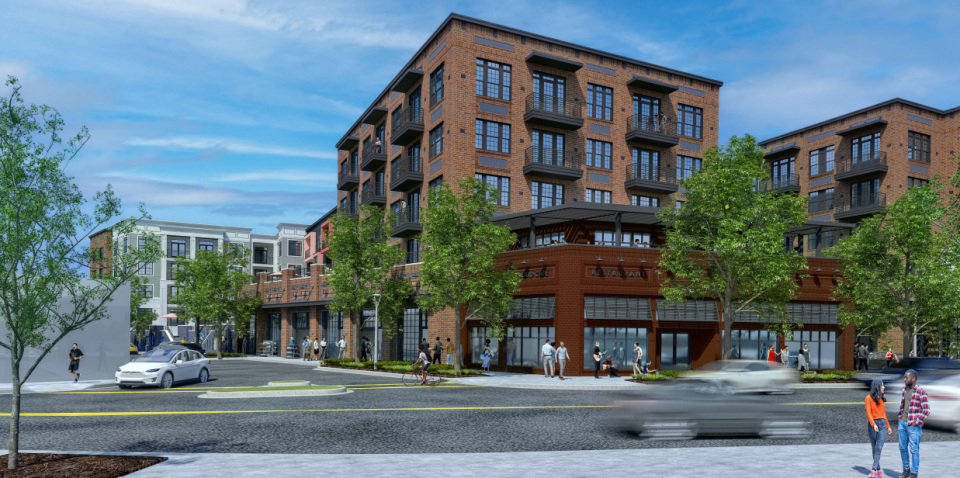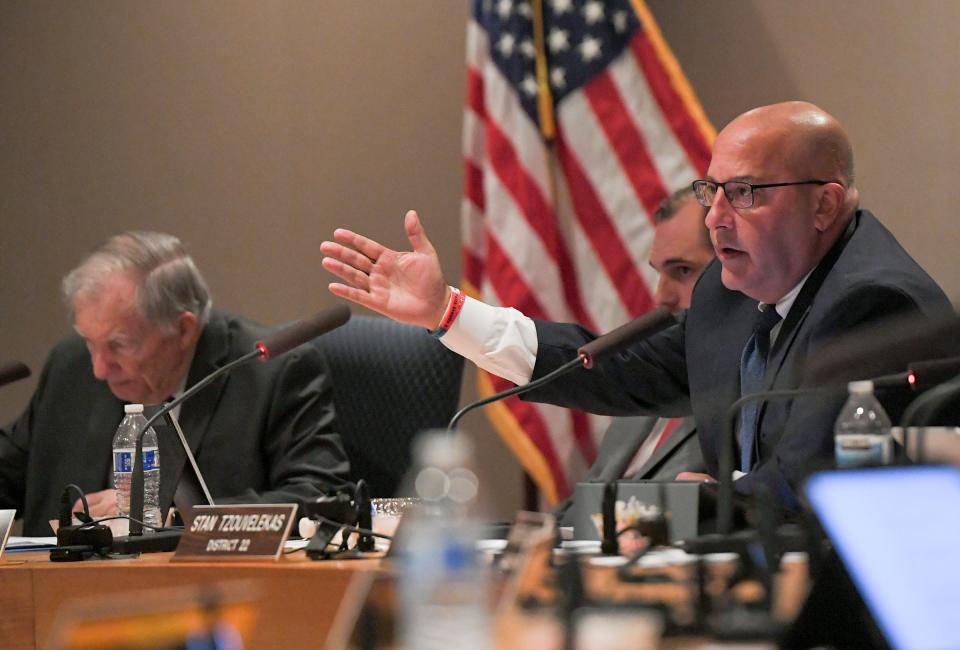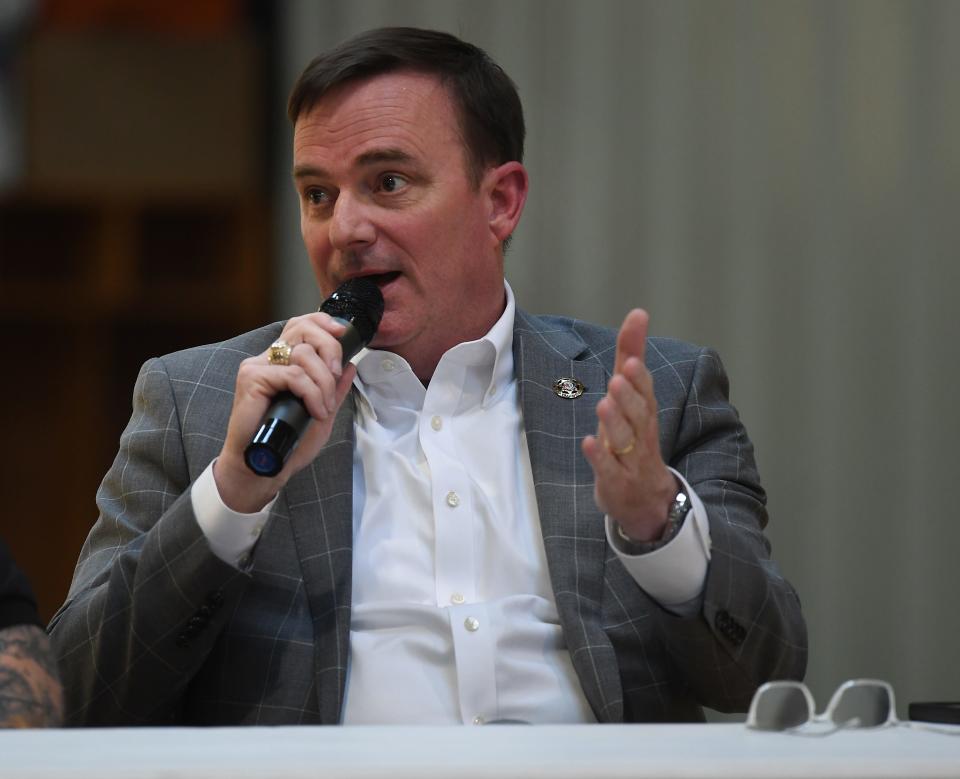Controversial Woven project narrowly approved for tax break by Greenville County Council
Just months after promising to strive for unity, Greenville County Council had a contentious night during its Tuesday, Sept. 19 meeting.
Councilors narrowly approved the Woven development, by a 7 to 5 vote, for a special source tax credit.
A grant from South Carolina’s Opioid Recovery Fund for the Greenville County Sherrif's Office was also approved. Two ordinances from Councilmember Stan Tzouvelekas were also introduced.
The next council meeting will be held on Oct. 3.
Here are three key takeaways from Tuesday night’s meeting:
Woven approved for tax abatement
Woven, a controversial development planned for Pendleton Street in West Greenville, was approved for a tax abatement by the council.
Since it was its third reading of the project, a public hearing was held.
Margaret McGinty, a resident of West Greenville, spoke out against the project.
“I just want to urge you to stop this project. It is not right for our neighborhood,” McGinty said.

Another resident, Sam King, echoed the same concerns.
“Just because the county can approve a project does not mean that it should,” King said.
Residents who spoke out against the development are concerned about the size and character of the building in comparison to the rest of the structures in the area known as, The Village, in West Greenville.
The Woven project includes 20,000 square feet of retail and commercial offerings. There are 214 residential units planned, including 44 units for affordable housing.
Approved for a special source credit in August by Greenville County’s Finance Committee, chaired by Butch Kirven (District 27), the project has a controversial history.
The Workforce and Affordability Policy allows tax abatements for projects including 20% of its total housing units for affordable and working housing.
County Council does not have the authority to approve or reject the Woven project from being developed since it is within Greenville’s city limits. It received final approval from city council in January.
“I agree ... that this is not going to solve the affordable housing problem. But I’m confident it will help,” Councilmember Chris Harrison said, explaining his reasoning for voting to approve the project for a special source credit during the meeting.
Alan Mitchell (District 23) said he voted against the credit due to residents' concerns for the project.
"The people in that side of town are hurting. They cried to city and county council and it appears their cries fall upon deaf ears," Mitchell said.
In the end, the ordinance for the credit passed, as councilmembers Joey Russo, Michael Barnes, Chris Harrison, Liz Seman, Ennis Fant, Butch Kirven and Dan Tripp voted "yes" to approve the credit. Benton Blount, Steve Shaw, Stan Tzouvelekas, Alan Mitchell and Rick Bradley voting "no."

Tzouvelekas introduces two Greenville County ordinances
Councilor Tzouvelekas introduced two ordinances during Tuesday’s meeting ― one to prohibit public funds to engage lobbyists or public relations representatives.
As Tzouvelekas began introducing the ordinances, Chairman Dan Tripp said he was out of order as he failed to make a motion for the ordinances. The meeting was then adjourned, abruptly, after Tzouvelekas continued to ignore Tripp.
“I just do not believe Greenville County funds should ever be paid to private entities or individuals to advocate for more funds or actions from the state or local governments,” Tzouvelekas told the Greenville News Wednesday morning. “And those funds should never be influencing decisions of any local governments."
The second ordinance would prohibit public mask requirements in Greenville County unless there is a federal mask mandate.
The first ordinance was sent to the finance committee. The meeting was adjourned before the second ordinance could be sent to the appropriate committee.

GCSO granted funds from South Carolina Opioid Recovery Fund Board
On the consent agenda, funds from the South Carolina Opioid Recovery Fund Board (SCORF Board) were accepted. Effective in October, $561,000 will be provided to the Greenville County Sherrif’s Office (GCSO.)
The SCORF Board, created by legislation as a requirement of the SC Opioid Settlement Allocation Agreement, disburses the money from the Opioid Recovery Fund.
According to the application for the funds, “the opioid crisis has been running particularly rampant in Greenville County, as compared to most other counties in South Carolina.”
The application states the county has continued to see a steady increase each year in fentanyl and opioid related overdoses and “consistently ranks in the top ten counties for suspected overdose.”
The money will be used to continue to raise awareness about opioid addiction through partnerships with Just Say Something, RIZE Prevention and Safe RX.
Savannah Moss covers Greenville County politics and growth & development. Reach her via email at smoss@gannett.com.
This article originally appeared on Greenville News: Greenville County Council meeting contentious over Woven, ordinances

